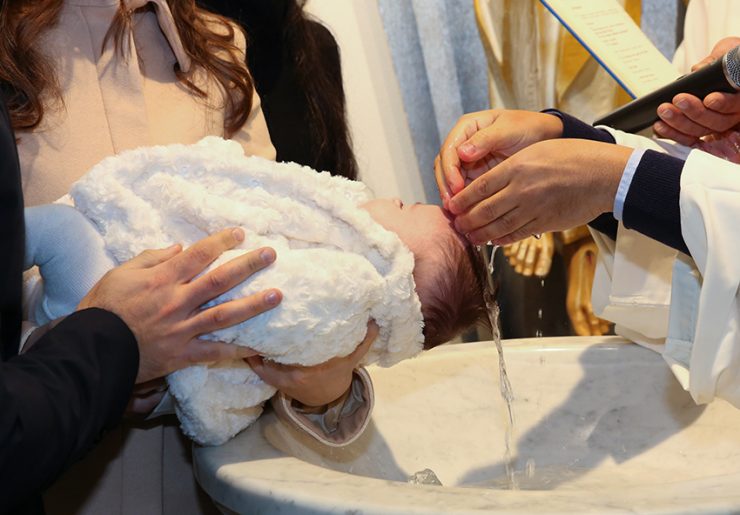Christenings
Each week 2,200 families join us by bringing their child to be christened (baptised) in one of the Church of England’s churches.
What is a Christening?
During a christening your child will be baptized with water. This involves a small amount of water being poured on the child’s head as a sign of a new beginning and becoming part of God’s family. During the service you as parents and your chosen Godparents will be asked to make promises on your child’s behalf.
A Christening is the start of an amazing journey of faith for your child and a special day for all your friends and family.
As parents, choosing to have your child christened can feel like you are making a choice on behalf of your child which is part of giving them the best start in life, and includes the encouragement of godparents and the protection and blessing of God.
Organising a Christening
Once you have decided to get your child Christened, your first point of contact is your local church. Your vicar will arrange to meet with your family to explain and start the process of organising the Christening. To find your nearest church go to Find A Church or if you know who your local vicar is, contact information is available on our Directory Live.
Adult Baptisms
There are some people who grow up in the Church because they have been christened (baptised) as children but that is not always the case. Increasingly older people – from teenagers to great grandparents – are making their own decision to become one of God’s children.
First Steps
If you are considering Adult Baptism and have never been baptised, start by talking to Christian friends or to Christians you know and trust. Go to church and have an informal chat with your vicar.
It might be helpful to read about the Christian faith or there are introductory courses such as the Windows Into courses run in the diocese. Add link
It is likely you be prepared for baptism and confirmation at the same time and you will be encouraged to join an informal course of training about the faith.
You will normally be confirmed at the same service in which you are baptised which takes place at the font, where water will be poured over your head. You will be asked to make the promises of baptism, repenting of your sins and turning to Christ. You must declare before God that you accept the Christian faith. The priest who baptises you will call you by your name and then use the words based on Holy Scripture: ‘I baptise you in the name of the Father and of the Son and of the Holy Spirit.’
The baptism of adults is normally followed immediately by Confirmation and First Communion.
Christened as a baby?
Many people were christened (baptised) as a baby but then have little further contact with the Church. Baptism is, however, permanent. So, if you were baptised as a baby, in whatever church that took place, you do not need to be baptised again.
From another denomination?
If you are a Christian from another denomination but feel drawn towards the Church of England, providing you have been baptised, and confirmed by a bishop, in your original denomination, after a period of preparation, you will be received into the Church of England, probably by a bishop during a confirmation service. If you have not been confirmed, or even baptised, then you will be prepared for this with others at the same stage as yourself.
Confirmation
People who have been baptised already may be confirmed provided they are old enough to renew for themselves the promises made on their behalf at their baptism by their parents and godparents. It is usual for people only to be admitted to Holy Communion once they have made that affirmation of faith and have been confirmed by the Bishop.
Confirmation usually takes place at the Eucharist at which the bishop presides. He will use the opportunity of the sermon to talk to the candidates about the responsibilities of adult Christian life and they will then make their public profession of faith. Any unbaptised candidates are baptised and the Bishop prays that the Holy Spirit will come upon those who are to be confirmed.



